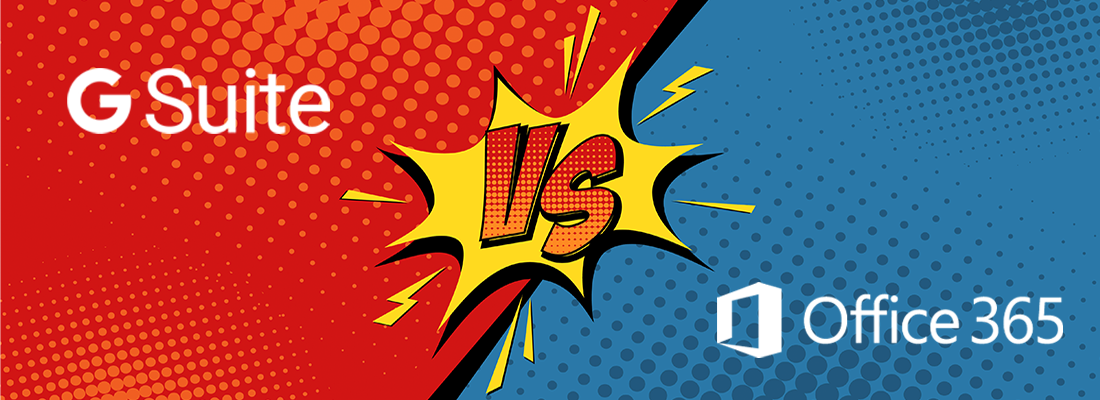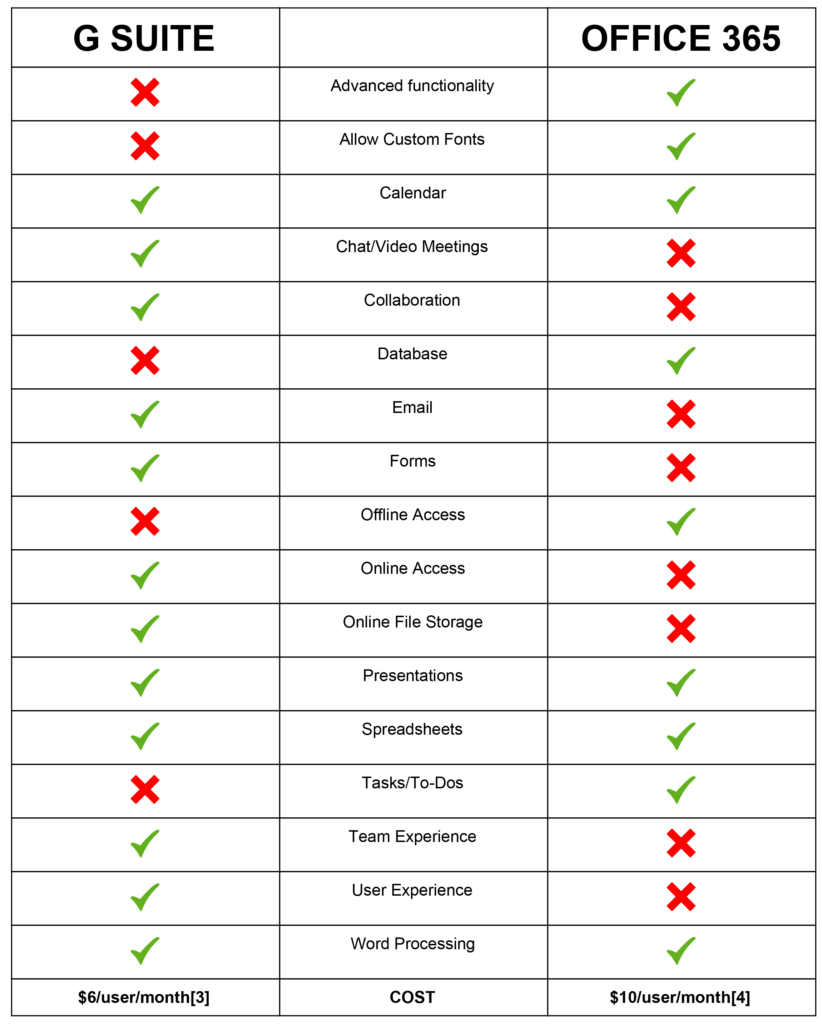A side-by-side comparison of G Suite and Office 365 from the viewpoint of everyday use in business.

15 years ago, a well-known and popular search engine branched out with a web-based email program which quickly outstripped the competition and now enjoys over 1.5 billion users[1]. Google quickly followed up with its initial success by creating a hugely competitive suite of applications: word processing, spreadsheets, and presentations.
Their main competitor, Microsoft Office, had historically been a software-only platform. However, it was readily apparent that being able to operate in the cloud was the way of the future. Adapting their software to online use, Office 365 was released within a few years of G Suite[2](then known as Google Apps) and both programs continue to enjoy a loyal and growing following.
So which is better for business users?
If you ask 10 people that question, you’ll likely get 15 different answers. Maybe 25.
Let’s take a closer look at each of these programs and explore their similarities and differences to give you all the information you need to make the right choice for you and your company.
Similarities
Both G Suite and Office 365 offer the basics. They have full-featured email management systems that include calendar options. Both platforms offer word processing, spreadsheets, and presentation programs to make it easy to create the items you need in your business. In addition, both G Suite and Office 365 give you access to the programs online, even allowing you to store all your files online, so you can literally access your business files anywhere you can find a computer and internet.
Both G Suite and Office 365 give you access to the programs online
Differences
It’s not 6 of one, half dozen of the other though. There are some key differences which can really help you decide which route you want to go. First, G Suite can be a bit difficult to use offline, while Office comes with licensing to download their suite of programs to your computer should you desire. Office 365 also comes with a database program that G Suite doesn’t have a match for (yet, anyway!). And Excel is still better than Google Sheets for complex data manipulation. And if you use custom fonts in your business, you can’t upload them for use in G Suite.
Yet Office doesn’t have it all its own way. The online interface for using apps like Word and Excel is pretty clunky still and slow and painful to use. In addition, Microsoft’s OneDrive, the online storage option for your files, can be glitchy and slow. And Outlook is archaic compared to Gmail’s easy-to-use user interface. (Outlook also just gives you a way to check your email; Gmail actually hosts it for you).
Costs
Neither option is break-the-bank expensive. Both have monthly plans and annual plans, and each is per user in your company. As of this writing, Gmail is $6 per user/per month[3] and Office 365 is $10 per user/per month[4]. They both do offer other options, but the two mentioned here are fairly compatible in features.
User Experience
Let’s compare both of these programs from a user experience. Having worked extensively with both programs over the past 10-15 years, I make no secret of my preferences.
Email: For email, G Suite wins hands down. Being able to search just like you would in a search engine is super powerful. Outlook has a search feature too, but it’s not nearly as powerful as the one in Gmail.
Word Processing: For basic word processing, G Suite is preferable. There are addons which can give you accurate word counts and help build tables of content, should you need them. While Microsoft Word can be more powerful in some areas, I’ve found that if you need that deeper functionality, you probably actually need a desktop publishing program and should skip the word processor all together.

Spreadsheets: Although I use and love G Suite’s Sheets program, I have to go with Microsoft Excel on this one. I’ll use Sheets for simple spreadsheets, especially if I need to collaborate or continuously update for a team. But to really get the functionality, Excel still stands on top. Sheets is trying to catch up, but they have a long way to go. I’ve been known to use Excel to generate and portray my data, then update Sheets for sharing with my team.
Presentations: This is probably pretty equal between the two. G Suite’s Slides can do pretty much everything that’s needful. The key here would be: how are you using the presentation you are creating? If lack of internet could be a factor, then go with Microsoft PowerPoint.
Bottom Line
Okay, let’s look at this from a visual perspective and get the full picture:

What it really comes down to, is what do you need? Do your employees work remotely and need good, online access? G Suite is likely your best bet. Do your employees need advanced functionality? Office 365 may be what you need.
Or you can do what a lot of people do: Use both. At WhatArmy, we use G Suite and Office 365 both. We need the online accessibility of G Suite, and the advanced features of Office 365. It’s worth it to us to have everyone on G Suite and then pay for Office 365 for those staff members who need it to do their jobs.
There’s no right or wrong answer. The only answer is what works best for you!
Want to give G Suite a try? Let us know! We’re happy to set it up for you and walk you through how to get the most out of it.
[1] https://expandedramblings.com/index.php/gmail-statistics/
[2] https://en.wikipedia.org/wiki/Office_365
[3] https://refergsuite.app.goo.gl/5vmq
[4] https://products.office.com/en-us/compare-all-microsoft-office-products? activetab=tab:primaryr2



